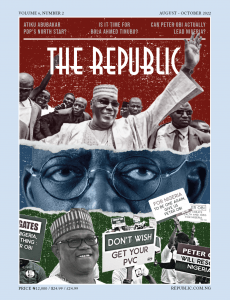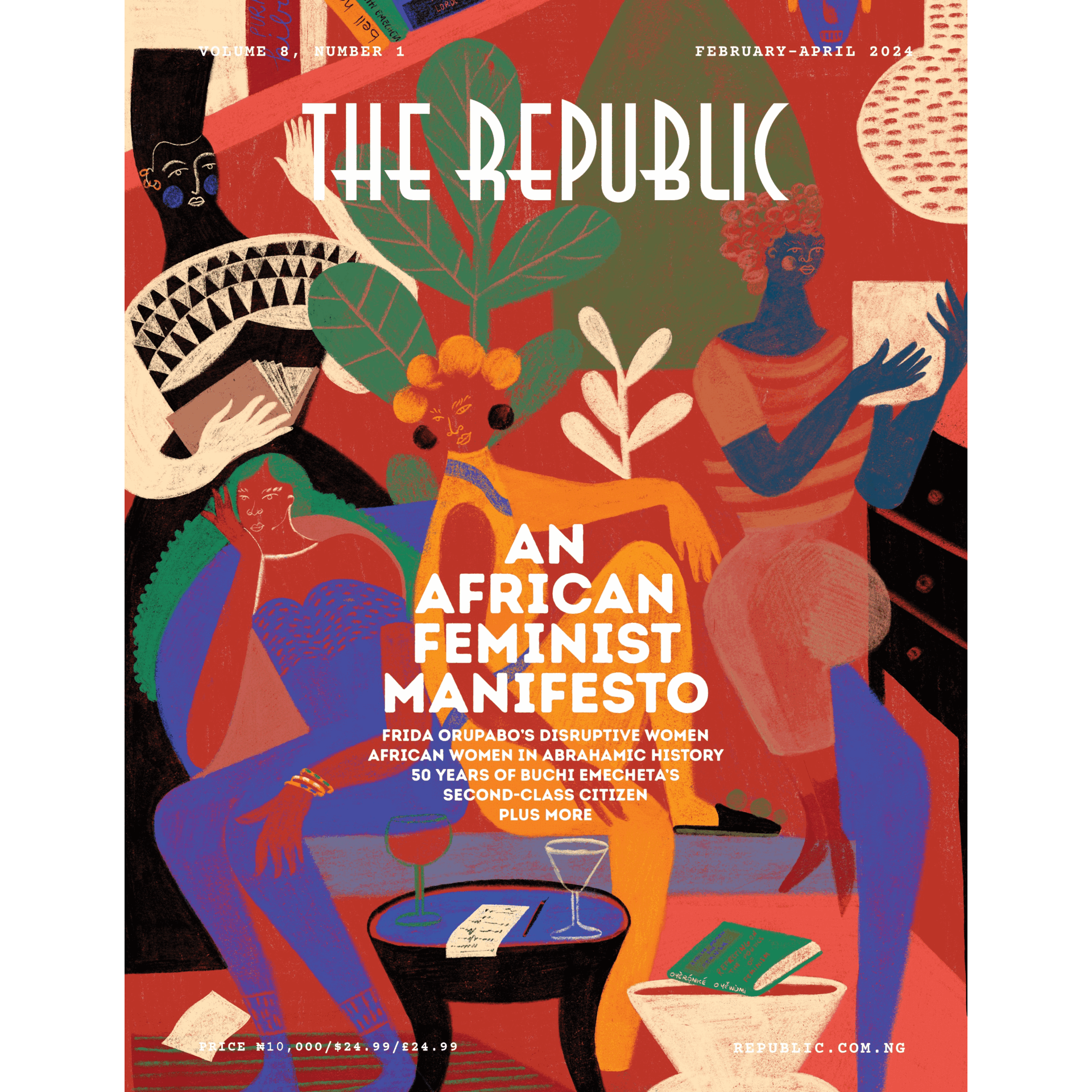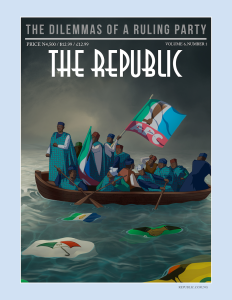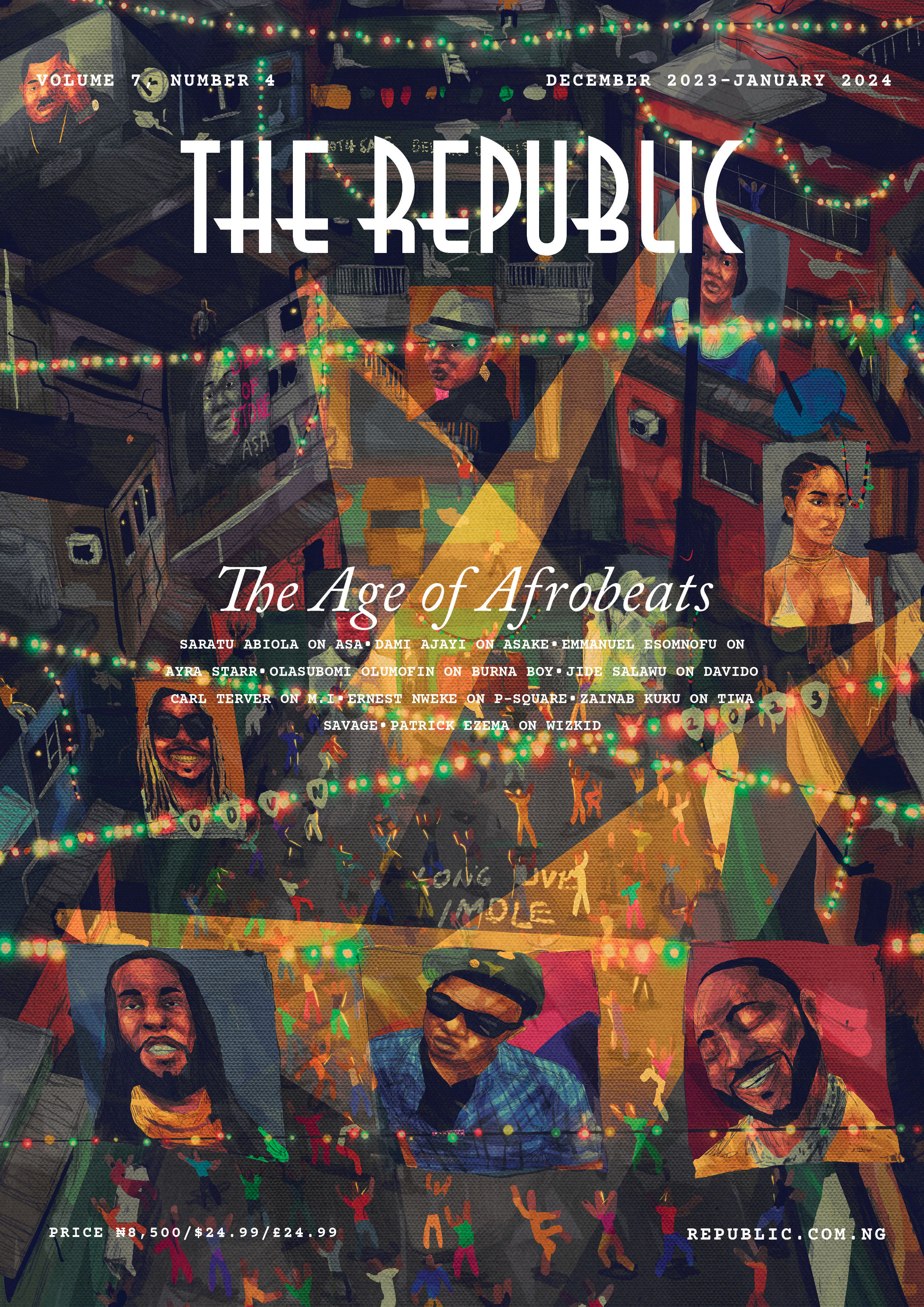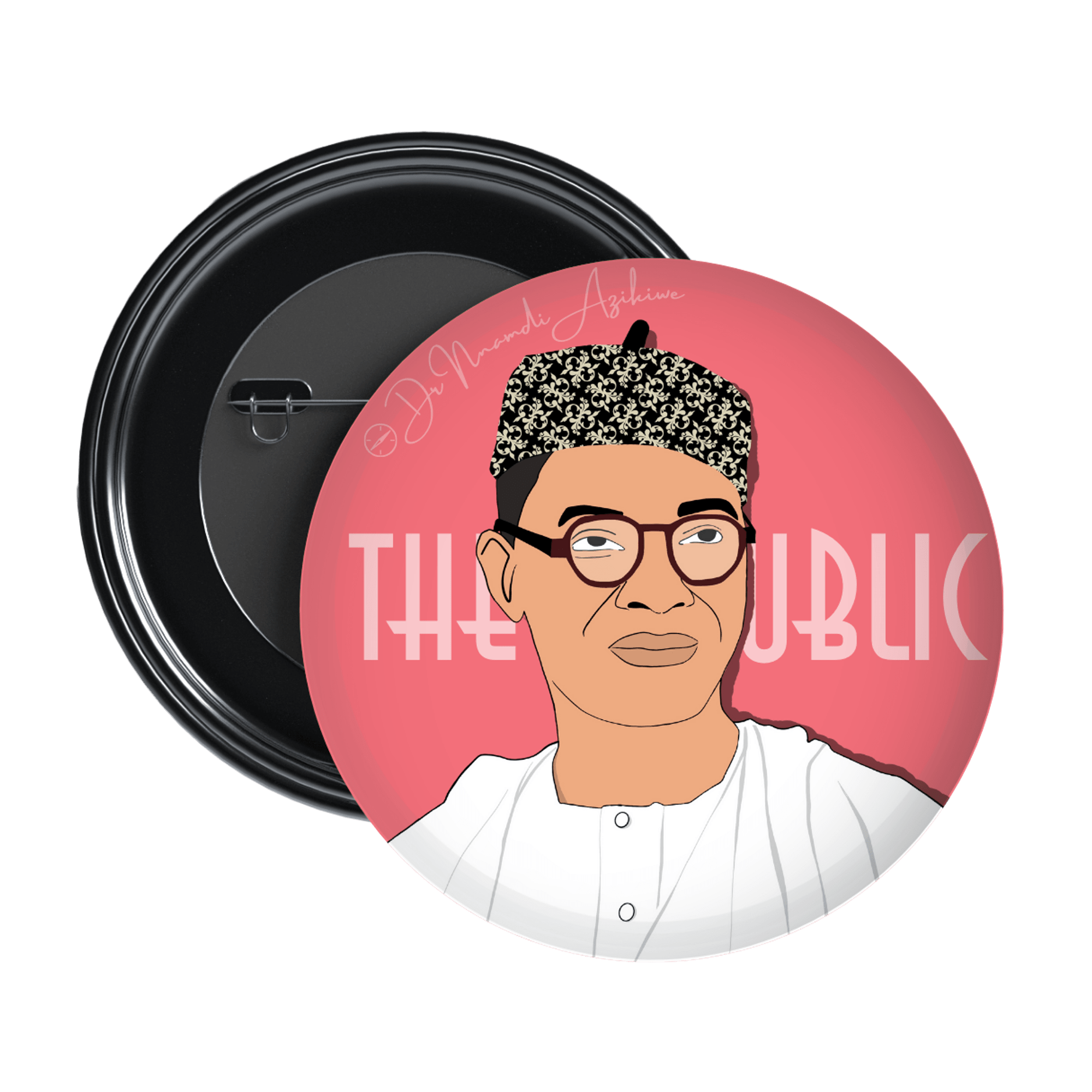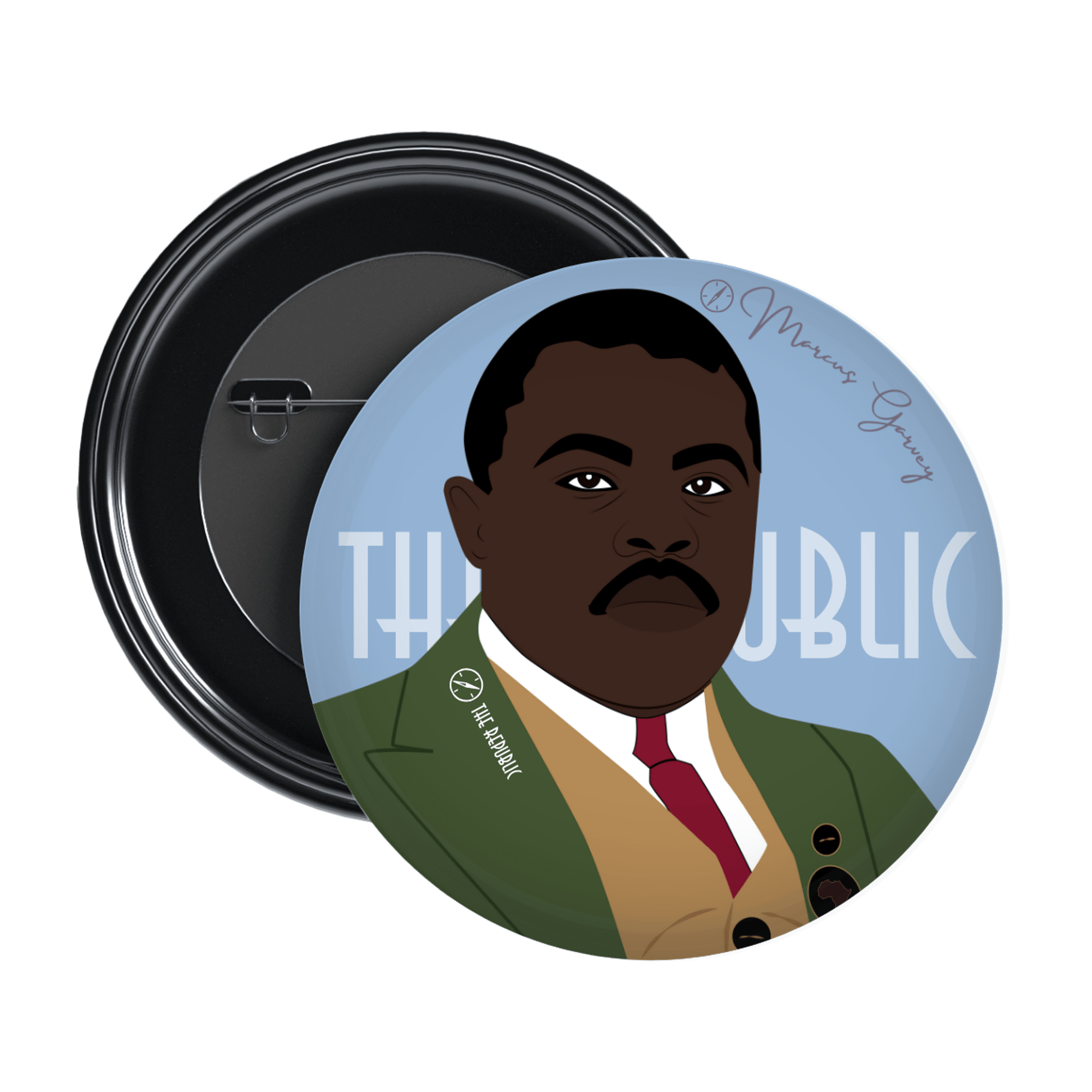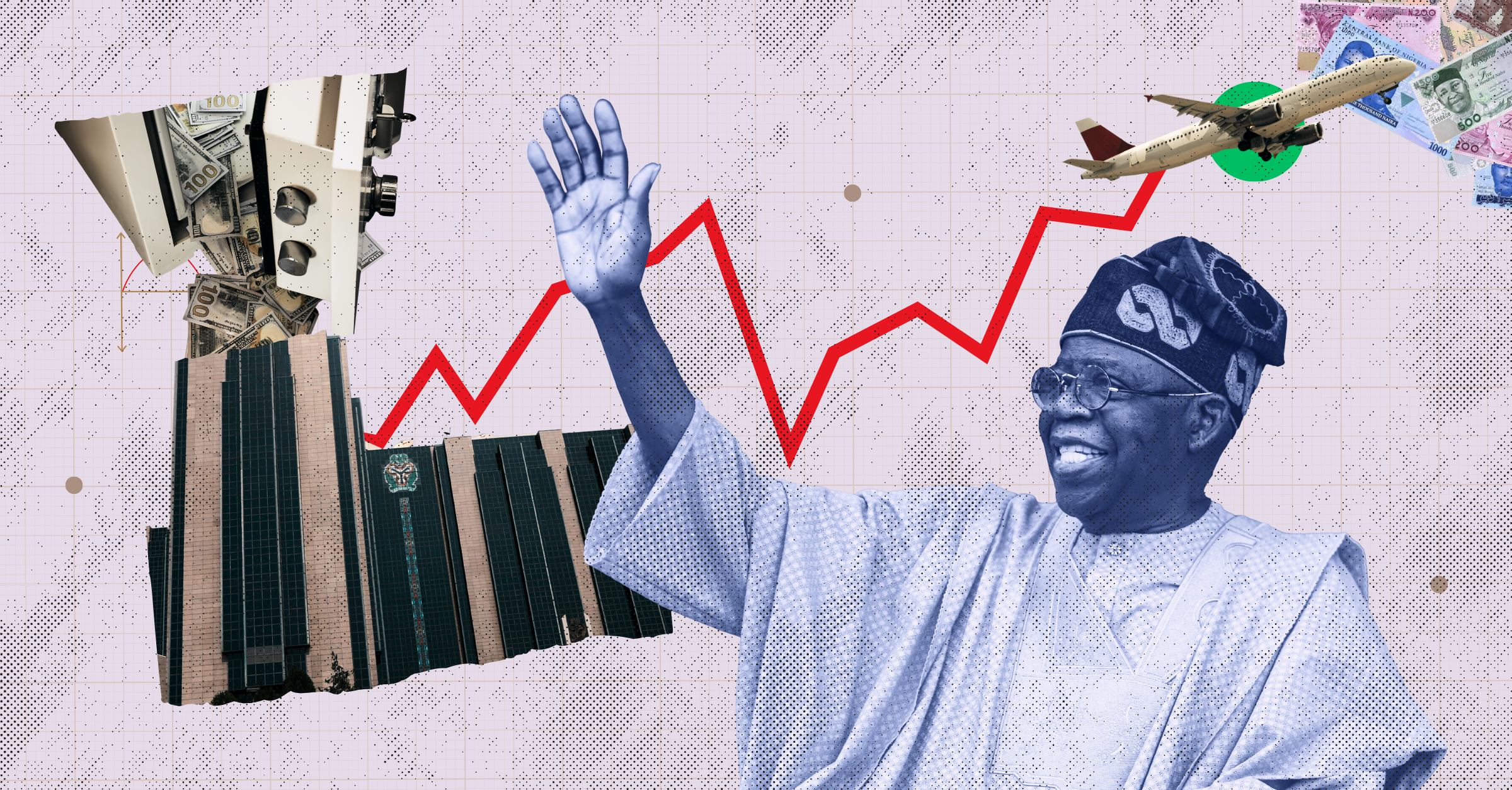
Photo illustration by Dami Mojid for THE REPUBLIC.
the ministry of political affairs
The Elusive Promise of Tinubu’s 4D Doctrine

Photo illustration by Dami Mojid for THE REPUBLIC.
the ministry of political affairs
The Elusive Promise of Tinubu’s 4D Doctrine
President Bola Ahmed Tinubu marked his first year in office on 29 May 2024. In that time, his administration has been marked by significant contradictions regarding his foreign policy approach. Between the disparities in the domestic realities of Nigerians and the president’s lofty foreign policy objectives, the highly stylized but often fruitless engagements with foreign dignitaries, and the pellucid yet seldom understood 4D foreign policy doctrine, one question pops out: what exactly has been Tinubu’s foreign policy approach one year into his tenure?
The answer to this question lies in a robust analysis of Nigeria’s position in the global space, as well an appraisal of the effectiveness of its diplomatic strategies. In highlighting these, it will become more apparent that Tinubu’s policies have a lot of promise but have been hampered by a scatter gun approach towards domestic issues. While Femi Amele, a prominent radio personality and commentator on national foreign policy and foreign affairs pointed out to me that ‘one year in office is not enough time to see significant strides with regards to Tinubu’s foreign policy objectives,’ I believe that the inertia observed on the foreign stage is as a result of poor socio-economic planning on the domestic front.
THE LEGACY OF NIGERIA’S FOREIGN POLICY
Nigeria has long been a regional powerhouse, with its foreign policy deeply intertwined with the personalities of its presidents. Since gaining independence from Britain in 1960, Nigeria aspired to be the heartbeat of Africa’s development and a leading figure in the continent’s global relations. During the decolonization period, Nigeria played a significant role in the formation of the Organization of African Unity in 1963, positioning itself as a leader in the African liberation movement. The principles of sovereign equality, non-interference in internal affairs, and peaceful dispute resolution became hallmarks of Nigeria’s diplomatic efforts. The 1980s and 1990s witnessed significant shifts as Nigeria grappled with domestic and global economic changes due to a fall in the global price of oil, inflation, and a rise in interest rates. Under the leadership of General Ibrahim Babangida (1985-1993), Nigeria’s foreign policy adopted a more pragmatic approach known as the New Economic Diplomacy, which was first adopted in 1988 and spearheaded by the external affairs minister at the time, General Ike Nwachukwu. This strategy sought to attract foreign investment and foster economic partnerships, even while maintaining a stance of non-alignment. The return to democratic rule in 1999 marked another pivotal shift.
President Olusegun Obasanjo’s administration (1999-2007) revitalized Nigeria’s foreign policy with an emphasis on re-engaging the international community and reclaiming Nigeria’s leadership role in Africa. Obasanjo’s tenure was marked by a reaffirmation of non-alignment and a renewed focus on economic and citizen diplomacy. This period saw Nigeria playing active roles in regional peacekeeping missions and continental organizations, such as a decisive intervention in Liberia which helped to end the civil war in 2003. Despite these efforts, Nigeria’s decline on the international stage became apparent over time. Through the 1980s, 1990s and early 2000s, Nigeria’s foreign policy has shifted in response to changing leadership, reflecting each president’s priorities and vision. From President Umaru Yar’adua’s focus on citizen diplomacy (2007-2010) to Goodluck Jonathan’s ( 2010-2015) economic foreign policy aimed at attracting foreign direct investment, each administration has left its mark. Muhammadu Buhari’s tenure (2015-2023), although justifiably criticized for its socio-economic and security policy failures, leveraged Nigeria’s regional power to engage in political crises and strengthen bilateral relations, particularly with China.
However, Nigeria’s decline on the global stage both in terms of its soft and hard power projection can be attributed to several factors. Economic instability, primarily driven by fluctuations in oil prices, has severely impacted the country’s ability to project power and influence internationally. Persistent corruption, political instability, and inadequate infrastructure have further undermined Nigeria’s standing. Additionally, the inconsistent and often reactionary foreign policies, driven by immediate economic needs rather than a long-term strategic vision, have weakened Nigeria’s position. A prime example of this was in 2019 when after ratifying the African Continental Free Trade Agreement, Nigeria closed its borders without warning, which caused major trade disruptions. The emphasis on short-term gains has often overshadowed the broader objectives of sustainable development and regional leadership. This decline is also reflected in Nigeria’s reduced involvement in key international organizations and peacekeeping missions, areas where it once held significant sway. Its decision to pull out of peace-keeping missions in Sudan’s Darfur region in 2004 as well as a lack of interest in intervening in conflicts in Somalia and Mali have highlighted its weakened position in the continent as well as the emergence of new external powers in China and Russia.
shop the republic
-
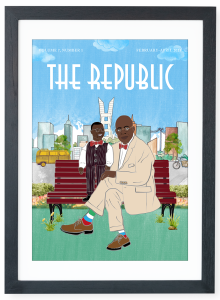 ₦70,000.00 – ₦75,000.00Select options This product has multiple variants. The options may be chosen on the product page
₦70,000.00 – ₦75,000.00Select options This product has multiple variants. The options may be chosen on the product page -
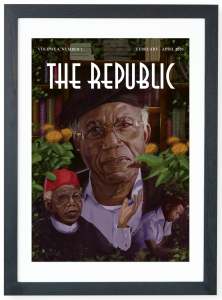 ₦70,000.00 – ₦75,000.00Select options This product has multiple variants. The options may be chosen on the product page
₦70,000.00 – ₦75,000.00Select options This product has multiple variants. The options may be chosen on the product page -
 ₦70,000.00 – ₦75,000.00Select options This product has multiple variants. The options may be chosen on the product page
₦70,000.00 – ₦75,000.00Select options This product has multiple variants. The options may be chosen on the product page -
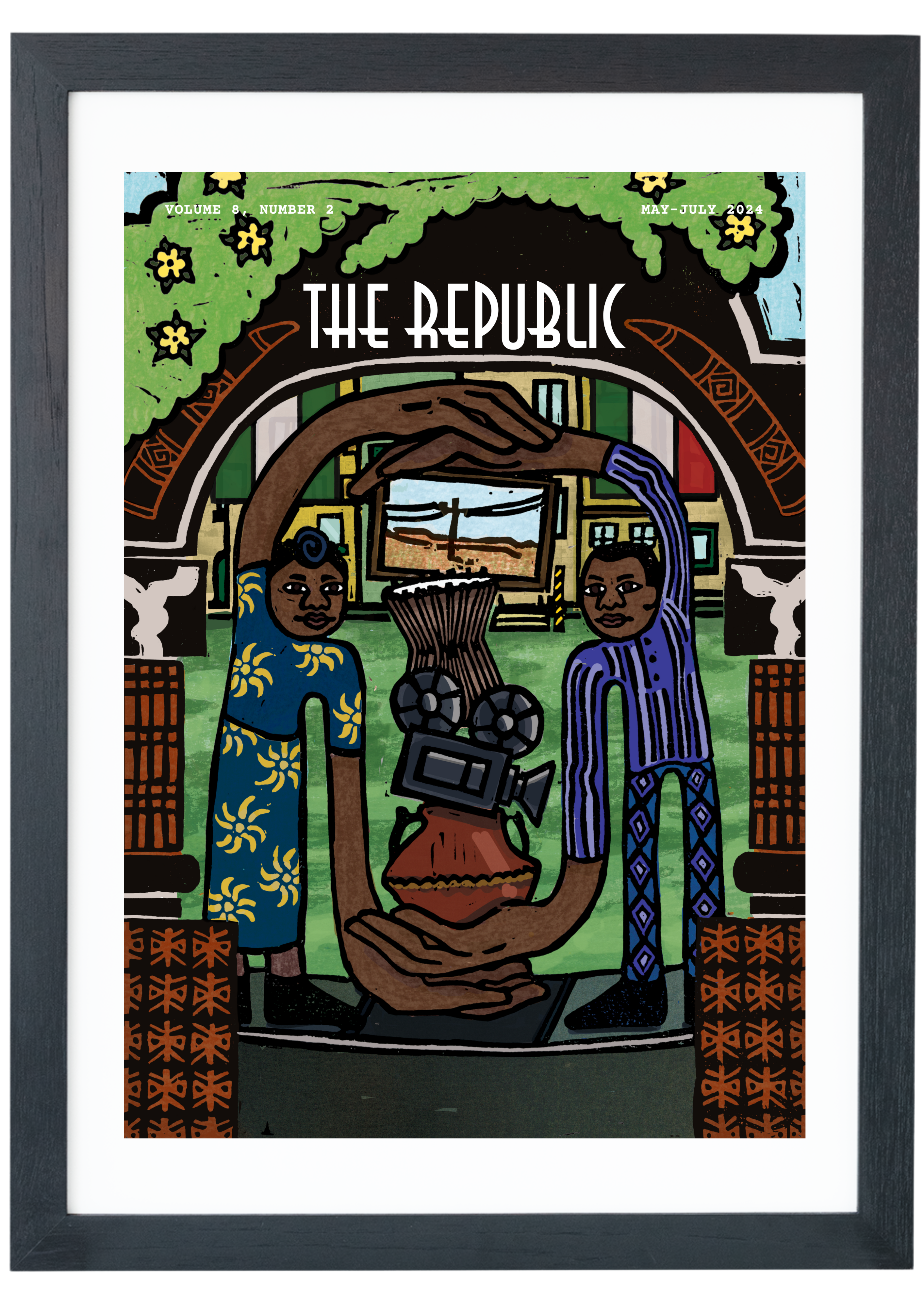 ₦140,000.00 – ₦150,000.00Select options This product has multiple variants. The options may be chosen on the product page
₦140,000.00 – ₦150,000.00Select options This product has multiple variants. The options may be chosen on the product page
shop the republic
-
 ₦70,000.00 – ₦75,000.00Select options This product has multiple variants. The options may be chosen on the product page
₦70,000.00 – ₦75,000.00Select options This product has multiple variants. The options may be chosen on the product page
THE SUCCESSES OF ÁFÀMÉFÙNÀ
In a way that cancels most odds, Áfàméfùnà excels in its writing and the level of research that went into it. The storytelling is well-rounded and brilliantly crafted. With the help of the memories of the titular character and his wife, this movie employs a reverse chronological order in its storytelling. The plot unfolds in a way that the richness and suspense of the movie are held together to the very end. The conversations flow realistically from scene to scene in a way that makes imagining real people having similar conversations easy.
There are numerous pieces of excellence that merge to bring Áfàméfùnà as close to perfection as cinematically possible. The everydayness of the extras—which is the point of having extras in a play or a movie—is one such instance. The success of the wardrobe and costume department in adorning the cast in believable garbs and looks is commendable. The ability of the hands behind the camera to capture aerial views of the market added an almost gustatory familiarity to the market scene. The intentional details that went into setting the scenes are also noteworthy. When we first see the home scenes, the camera catches a carefully placed 2002 calendar bearing an image of Odogwu’s picture, something that can be expected from a successful Igbo businessman of that time. Later in the movie, we see Odogwu’s sitting room again. This time, family pictures of Odogwu with his wife and daughter sit side by side with images of Jesus and Mary, all typical features of any Catholic Igbo family. These details come together to crown the efforts of the writers with a level of believability. In all, the general editing that ties these well-executed elements together contributes to making this a rich watch.
shop the republic
THE TINUBU 4D DOCTRINE: FIT FOR PAPER OR PURPOSE?
Given the context of Nigeria’s slow but undeniably steady decline on the global stage in successive administrations, Tinubu’s diplomatic strategy, at least on paper, showed a lot of promise. In December 2023, Tinubu’s administration unveiled its foreign policy strategy based on the 4Ds: Development, Democracy, Demography, and Diaspora. This doctrine was based on the broader objectives of Tinubu’s ‘Renewed Hope Agenda’, which aims to protect against external aggression, promote favourable outcomes in international engagements, and enhance Nigeria’s global standing.
Economic diplomacy has been the cornerstone of Tinubu’s diplomatic efforts so far. His inaugural decisions to remove the fuel subsidy and unify the exchange rate represented significant policy shifts from the previous administration. These measures were ostensibly aimed at stabilizing Nigeria’s economy and aligning with the recommendations of Bretton Woods institutions such as the IMF to attract foreign investments. Speaking to me, Patrick Adewumi, a foreign policy researcher, emphasized that Tinubu’s administration has taken proactive steps in attracting foreign direct investment. He highlighted that ‘the president’s administration has attracted about $30 billion in foreign directive investment.’ He also acknowledged the timeline for executing these investments, noting that many Memorandums of Understanding (MOUs) have ‘two, three, four-year timeline execution.’ This reflects a strategic effort to position Nigeria as an attractive destination for industrialization and a greener economy.
However, Adewumi pointed out a critical challenge: Nigeria, he said, ‘has been very active in signing treaties and MOUs and engaging at international levels. But how do we translate this into a better positioning for Nigeria?’ This underscores the essential need to not only secure international agreements but also to ensure their effective implementation, thereby translating diplomatic engagements into tangible benefits for Nigeria’s economic development. This point becomes stark when considering the domestic realities of Nigerian citizens, partly due to the Tinubu administration’s domestic policies. The poverty level in the country has gone up; the country is also experiencing falling purchasing power among citizens and heightened food inflation. Similarly, at least seven well-established multinational companies have exited Nigeria due to unfavourable conditions, casting doubt on the efficacy of Tinubu’s economic diplomacy. One prominent example was the exit of Procter and Gamble, who decided to leave Nigeria after 30 years, citing a challenging business environment and unfavourable macro-economic conditions. Additionally, unforced errors, such as the false claim by Ajuri Ngalele (the special assistant to the president on media and publicity) about Tinubu being the first African leader to ring the NASDAQ closing bell, have distracted from substantial economic discussions and damaged credibility.
Tinubu’s foreign policies have made positive strides so far. His priorities have spurred an array of strategic diplomatic engagements on both regional and global stages. His initial diplomatic mission to Paris in June 2023 for the Summit for a New Global Financial Pact highlighted Nigeria’s urgent need for foreign investments and set a proactive tone for his administration’s international outreach. Subsequently, Tinubu’s participation in the Economic Community of West African States (ECOWAS) summit in Guinea Bissau underscored his leadership ambitions within West Africa, as he positioned himself as a pivotal regional figure. His involvement in the African Union Media Coordination meeting further demonstrated his commitment to continental collaboration. At the G20 Leaders’ Summit in India, Tinubu’s efforts culminated in securing a significant $14 billion foreign investment commitment, signalling international confidence in Nigeria’s economic potential under his leadership. To further reinforce his diplomatic agenda, Tinubu’s visits to the Middle East, particularly the UAE and Saudi Arabia, aimed at fortifying bilateral relationships and attracting additional investments, illustrated a comprehensive strategy to integrate Nigeria more deeply into the global economic system. In a series of tweets made in April 2024, alongside a review on NTA news of Tinubu’s one year in office, the minister of foreign affairs, Yusuf Tuggar, justified Tinubu’s approach to foreign diplomacy as a necessary commitment to economic restructuring and stability, which is needed to secure the confidence of international investors and stakeholders, thereby positioning Nigeria as a pivotal player in the global economic arena. Similarly, Tinubu’s supporters have lauded his approach as one which strategically places Nigeria in a position to gain the favour of international political powers and financial institutions, projecting Nigeria as a stable and attractive environment for investment.
However, as Mr Amele rightly observed, ‘What eventually becomes your foreign policy must translate from your domestic policies.’ This statement underscores the essential connection between internal governance and international relations. From its onset, Tinubu’s administration has faced significant foreign policy challenges. Elected as the chairperson of ECOWAS in July 2023 shortly after assuming office, Tinubu’s acceptance speech emphasized a commitment to democracy and governance. However, his resolve was quickly tested in July 2023 when a military junta led by the head of the presidential guard, Abdourahmane Tchiani, successfully overthrew the democratically elected president, Mohamed Bazoum. Tinubu’s initial strong condemnation and subsequent economic sanctions against Niger Republic highlighted his commitment to ECOWAS principles. Yet, the situation escalated, leading to the withdrawal of Niger Republic, Mali, and Burkina Faso from ECOWAS and the formation of the Alliance of Sahel States. The failure to resolve the Niger Republic crisis underscored a decline in Nigeria’s regional influence, and reflects poorly on Tinubu’s diplomatic efforts. This episode revealed the complexities of balancing regional stability with national interests and highlighted the limitations of immediate, hardline responses to political upheavals. According to Adewumi, the administration’s handling of the Niger Republic coup, with an initial hardline stance followed by a more pragmatic approach ‘betrayed the broader aim of fostering regional cooperation.’ This shift underscores the difficulties in maintaining consistent foreign policy principles while addressing immediate political crises.
Furthermore, the planned railway and the trans-Saharan gas pipeline projects illustrate Nigeria’s ambitious economic diplomacy. However, these initiatives have faced criticism from citizens, who question the rationale behind financial commitments to international ventures amid severe economic hardships at home. This critique is particularly sharp when considering Nigeria’s involvement in the ECOWAS crisis, where the promotion of democracy abroad seems contradictory given the nation’s own democratic deficiencies. The financial and strategic focus on supporting a war effort had sparked further discontent, reflecting a tension between Nigeria’s foreign policy objectives and its internal realities. This scenario underscores the challenge of balancing the 4D doctrine with domestic imperatives. The ECOWAS crisis exemplifies the need for more nuanced diplomatic strategies to reconcile Nigeria’s renewed foreign policy aspirations with its internal socio-economic challenges. Ultimately, the interplay between Nigeria’s domestic issues and the current administration’s identity crisis has significantly influenced its foreign policy decisions in the first year, highlighting the necessity for a coherent and integrated approach.
shop the republic
THE FUTURE OF NIGERIA’S FOREIGN POLICY UNDER TINUBU
Looking ahead, Tinubu’s administration has the potential to recalibrate Nigeria’s foreign policy to better align with its aspirations and realities. This will require a steadfast commitment to addressing internal contradictions and a clear vision for Nigeria’s role on the global stage. The head of research and insights at Dataphyte, Oluseyi Olufemi, pointed out that ‘the key lessons for Tinubu as he proceeds into his subsequent years in power would include prioritizing cooperation instead of conflict and fostering regional cooperation for stability and economic wellbeing.’ This seems accurate as any effective foreign policy will hinge on the administration’s ability to adapt to changing global dynamics and internal challenges. By fostering regional stability, enhancing economic attractiveness, and building a robust diplomatic corps, Nigeria can position itself as a key player in African and global affairs.
This is a position shared by Adewumi. He highlighted the critical need for Tinubu’s administration to emphasize a more diplomatic approach in its foreign policy initiatives. According to Adewumi, ‘It’s important for this government to put emphasis on diplomacy.’ Adewumi emphasized Nigeria’s unavoidable involvement in African affairs, particularly in West Africa, due to its strategic positioning, noting that ‘Nigeria’s strategic positioning and socio-economic might make [Nigeria] almost involved in any issues of Africa and especially in the West Africa region.’ He acknowledged that Nigeria’s actions are subject to various interpretations but stressed the necessity for decisive action on security issues, asserting that ‘we cannot afford, not to act on taking decisive steps on issues of security.’
Tinubu’s foreign policy approach reflects the complexities and contradictions inherent in navigating Nigeria’s regional and global roles. While his administration has faced significant challenges in its first year, there are opportunities to realign strategies and enhance Nigeria’s influence. By addressing the gaps between strategic intentions and practical outcomes, Tinubu can steer Nigeria towards a more cohesive and effective foreign policy, fostering stability and development both at home and abroad. This approach is necessary given the current local and regional challenges
Olufemi’s call for a ‘coherent and purposeful approach’ suggests that Tinubu must prioritize internal stability and economic development to provide a solid foundation for his foreign policy ambitions. He recommended that the president’s ‘main task really is to find a balance between domestic issues and foreign policy issues.’ This balance, according to Olufemi ‘would require concerted efforts at the domestic front’ to address and resolve the country’s myriad social and economic problems. As such, Tinubu’s focus should be towards addressing domestic issues whilst using that as a platform to engage on favourable terms on the global front. This holistic approach is essential for Nigeria to assert its strategic importance in West Africa and beyond effectively.
By ensuring that domestic policies are robust and reflective of the needs and aspirations of the Nigerian people, Tinubu can create a more stable and attractive environment for foreign investors thereby enhancing Nigeria’s global standing and achieving his foreign policy goals. If these objectives are achieved, Tinubu’s administration has the potential to restore Nigeria’s regional leadership and global standing, but this will require navigating the inherent contradictions and focusing on sustainable, long-term goals. The world is watching, and Nigeria’s actions in the coming years will determine its future role on the international stage⎈
shop the republic
BUY THE MAGAZINE AND/OR THE COVER
-
 ₦140,000.00 – ₦150,000.00Select options This product has multiple variants. The options may be chosen on the product page
₦140,000.00 – ₦150,000.00Select options This product has multiple variants. The options may be chosen on the product page -
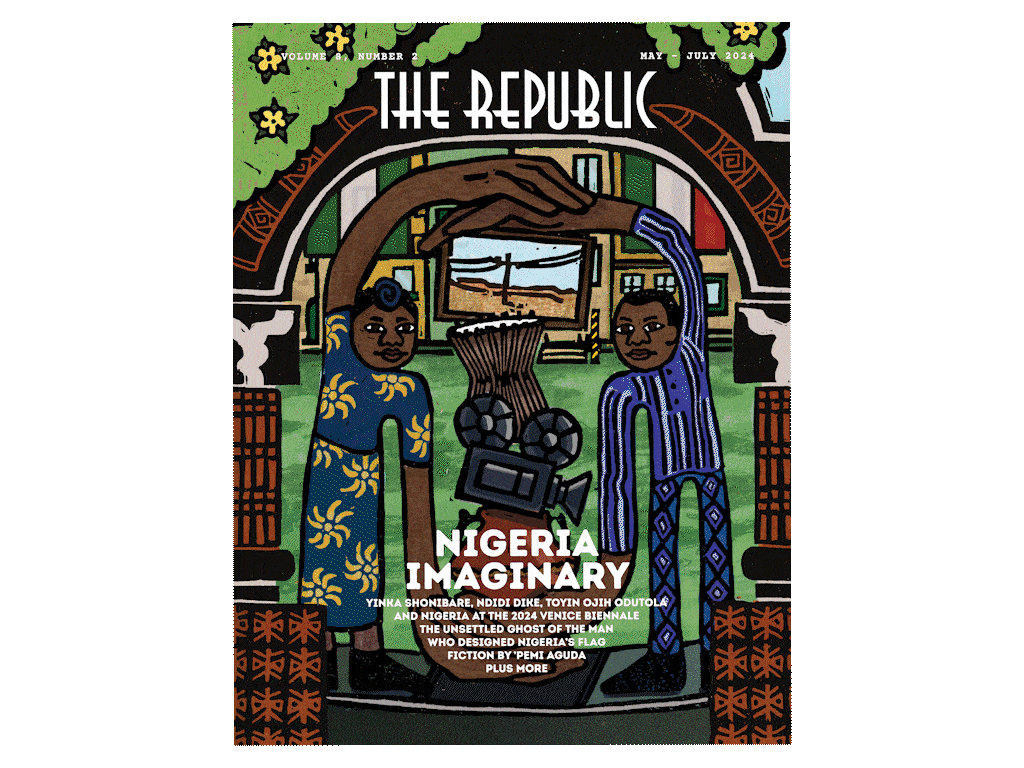 ₦10,000.00 – ₦30,000.00Select options This product has multiple variants. The options may be chosen on the product page
₦10,000.00 – ₦30,000.00Select options This product has multiple variants. The options may be chosen on the product page




